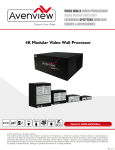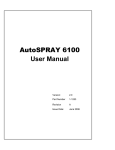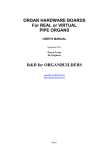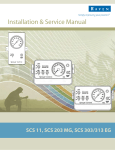Download Step 1 - Micro-Trak Systems, Inc.
Transcript
DirectConnect™ DirectConnect™ Kit For Liquid Application Control Connecting to Raven® 440/450 Series Controllers Contents Installation Overview 2 Installation for Single-Section Use 2 Installation for Multi-Section Use 2 Cabling Descriptions 3 Harness Diagram 4 Setup Overview 5 Flowmeter Calibration 5 Control Valve Selection 6 Control Valve Calibration Number 7 PWM Frequency 8 PWM High and Low Offsets 8 Pre-Field Testing - Inline Configuration 11 Field Testing - Inline Configuration 11 Pre-Field Testing - Bypass Configuration 12 Field Testing - Bypass Configuration 12 Troubleshooting13 Reference Section 15 Control Valve Delay/Advance 15 Low Limit 16 Harness Wiring Diagram 17 Plumbing and Component Install 18 Micro-Trak® DirectConnect™ P/N 50291 Installation Overview These instructions cover Micro-Trak® DirectConnect™ kit installation for Raven® 440/450 Sprayer Control Systems (Raven® SCS) for liquid applications. The wiring harness and system descriptions are the same for both 440 and 450 series controllers. Initial setup is slightly different for the two consoles — these differences are noted in the setup procedures. Start your installation by reviewing cables and harnesses shipped with your kit. Then, install all cabling to connect your existing spray valves and flowmeter to the Raven® SCS. (If you are installing new spray valves and flowmeter, please refer to the resource section on page 18 for additional installation instructions.) Finish by completing all setup instructions prior to starting any fieldwork . Note: Information about the Raven® SCS is intended as a general guide only. Please refer to your Raven® SCS Installation and Service Manual for specific information on your model. Installation for Single-Section Use 1. Connect the Raven to Micro-Trak Adapter cable to the Raven® SCS™ rate controller. 2. Connect 7-pin M/P and 10-pin M/P Extension Cables to the Raven to Micro-Trak Adapter cable. 3. Connect the Power/Boom Sections 1-5 Cable (7-pin M/P) to the 7-pin M/P Extension Cable. a. Connect shutoff valve to Section 1 connection (3-pin M/P) 4. Connect the Servo/Flow/Boom Section 6 Cable (10-pin M/P) to the 10-pin M/P Extension Cable. a. Connect flowmeter sensor to Flow connector (3-pin M/P tower) b. Connect control valve to Servo connector (3-pin W/P shroud) - If the servo valve runs backwards (opens when should be closing, etc.) the Servo Reversal Adapter can be used to reverse the polarity of the drive signal. 5. Turn Power ON/OFF switch on Raven® SCS™ console to OFF. a. Route WHITE wire from Raven to Micro-Trak Adapter cable to the vehicle 12VDC battery and connect it to the positive (+) terminal. b. Route BLACK wire from Raven to Micro-Trak Adapter cable to the vehicle 12VDC battery and connect it to the negative (-) terminal. 6. Secure cabling with wire ties. Installation for Multi-Section Use 1. Connect the Raven to Micro-Trak Adapter cable to the Raven® SCS™ rate controller. 2. Connect 7-pin M/P and 10-pin M/P Extension Cables to the Raven to Micro-Trak Adapter cable. 3. Connect the Power/Boom Sections 1-5 Cable (7-pin M/P) to the 7-pin M/P Extension Cable. a. Connect shutoff valves to Section 1-5 connections (3-pin M/Ps) b. If using Section 6, connect the male spade connector (orange wire) to the corresponding female spade connector (orange wire) on the Servo/Flow/Boom Section 6 Cable. 4. Connect the Servo/Flow/Boom Section 6 Cable (10-pin M/P) to the 10-pin M/P Extension Cable. a. Connect flowmeter sensor to Flow connector (3-pin M/P tower) b. Connect control valve to Servo connector (3-pin W/P shroud) - If the servo valve runs backwards (opens when should be closing, etc.) the Servo Reversal Adapter can be used to reverse the polarity of the drive signal. 5. Turn Power ON/OFF switch on Raven® SCS™ console to OFF. a. Route WHITE wire from Raven to Micro-Trak Adapter cable to the vehicle 12VDC battery and connect it to the positive (+) terminal. b. Route BLACK wire from Raven to Micro-Trak Adapter cable to the vehicle 12VDC battery and connect it to the negative (-) terminal. 6. Secure cabling with wire ties. Micro-Trak® DirectConnect™ 2 P/N 50291 Cabling Descriptions Raven to Micro-Trak Adapter Cable - P/N 17582 This adapter cable connects the Raven® SCS 16-pin connector and the DirectConnect™ branch and control cables. Power/Boom Sections 1-5 - P/N 17419 This cable provides 12VDC power and control for boom sections 1-5. Servo/Flow/Boom Section 6 - P/N 17420 This cable combines flow input, control output, and section 6 control in a single cable for liquid applications. Servo Reversal Adapter - P/N 17934 This short cable reverses the drive signals going to a control valve. It is used if a valve is operating backwards, i.e. opening when it should be closing, closing when it should be opening. Optional Extension Cables OPTIONAL 7-PIN CABLES P/N 14146 These optional cables give additional length beP/N 14147 tween the Raven to Micro-Trak Adapter cable and the other two branch cables. See system diagram P/N 14103 P/N 14236 on next page for more details. P/N 14237 Micro-Trak® DirectConnect™ 3 OPTIONAL 10-PIN CABLES 5' CABLE P/N 13220 5' CABLE 10' CABLE P/N 13221 10' CABLE 15' CABLE P/N 13222 15' CABLE 20' CABLE P/N 13223 20' CABLE 25' CABLE P/N 13224 25' CABLE P/N 14142 50' CABLE P/N 50291 Harness Diagram P/N 17582 (120”) P/N 17420 (120”) Control Flow SEE TABLES ON PREVIOUS PAGE FOR OPTIONAL EXTENSION CABLE LENGTHS (orange) These connections are not used with this kit. P/N 17419 (120”) 6 5 4 3 1 12VDC 2 Sections P/N 50291 4 Micro-Trak® DirectConnect™ Setup Overview Raven® SCS 440 Front Panel Proceed through all the follow steps to setup your implement prior to any fieldwork. Please note that some steps are specific to using a PWM (Pulse width modulation) device. Information about the Raven® SCS is intended as a general guide only. Please refer to your Raven® SCS Installation and Service Manual for specific information on your model. Flowmeter Calibration Control Valve Selection Control Valve Calibration PWM PWM Frequency ONLY PWM High/Low Offsets Pre-Field Testing (Inline) Field Testing (Inline) Pre-Field Testing (Bypass) Field Testing (Bypass) pg. 5 pg. 6 pg. 7 pg. 10 pg. 10 pg. 13 pg. 13 pg. 14 pg. 14 Raven® SCS 450 Front Panel Flowmeter Calibration Step 1 Find the flowmeter calibration (CAL) numbers printed on the tag on the flowmeter (See right). Use the “Pulses per 10 gallons” number — in this example, 730. 000000000 Step 2 Step 3 Step 4 Press “METER CAL” on the SCS Console Press “ENTER” Press “ENTER “ to save. METER CAL 5 CAL NUMBER ENTER Then Enter the CAL number from the flowmeter tag using the number buttons on the console Micro-Trak® DirectConnect™ 5 ENTER The display will show: RATE 00 METER CAL 0000 (NOTE: The METER CAL value entered will be displayed where the 4 zeros are in the example.) P/N 50291 Control Valve Selection The Control Valve type is entered during the initial programming of the Raven® Console. The type is selected when the console is powered up for the first time. Control Valve Type Choices View the valve type. Press and hold the SELF “SELF-TEST” button. TEST While the “Self-Test” button is pressed, the screen will scroll and display the following: • System Units selected (US or METRIC) • Speed Sensor Type selected (SP 1 or SP 2) • Valve Type selected ( C-SD, C-FC, C-F, C-P or C-PC) The selections for Valve Type are: • C-SD (standard valve) • C-FC (fast close valve) • C-F (fast valve) • C-P (PWM valve) • C-PC (PWM close valve) Match your Micro-trak® Control Valve Type to the Raven® Console: Micro-trak® Servo Valve select C-F (Fast Valve) Micro-trak® Standard EMD select C-F (Fast Valve) Micro-trak® PWM type EMD select C-PC (PWM Close Valve) Micro-trak® PWM Hydraulic Valve select C-PC (PWM Close valve) - Pump stops when sections are off (ground drive) Micro-trak® PWM Hydraulic Valve select C-P (PWM Valve) - Pump continues to run for tank agitation (sprayers) Selecting Control Valve Type Step 1 SELF TEST Press and Hold “SELF-TEST” button for approx. 20 seconds. The display will scroll through “Unit Type”, Speed Sensor Type” and “Valve Type” . Release when display stops scrolling. Step 2 ENTER Step 4 Step 3 Press “ENTER” until the display shows VALVE TYPE Micro-Trak® DirectConnect™ CE Press “CE” until the intended valve type is displayed. 6 ENTER Press “ENTER “ to save. P/N 50291 Control Valve Calibration The control valve calibration number is a 4-digit number specific to each valve type. The numbers tell the Raven® console important information about how the valve will react to control signals. Find your starting calibration number in the list below. Depending on system performance, it may be necessary to adjust the numbers slightly. Please refer to the digit definitions below, if any adjustments are necessary. Find your Micro-Trak® Control Valve Calibration Number Micro-trak® Servo Valve Micro-trak® Standard EMD Micro-trak® PWM type EMD Micro-trak® PWM Hydraulic Valve Micro-trak® PWM Hydraulic Valve 743 743 43 43 43 Definitions of Calibration Numbers (Servo Valve and Standard EMD value shown) 0743 Valve Backlash Dead Band Valve Speed Brake Point Digit Note: Since the calibration numbers enter the console screen from right to left, entering a value of “743” has the same calibration definition as “0743”. The Raven® consoles cannot accept “0” as an initial entered value. Description Range Definition Controls the time of first correction pulse after a Valve Backlash reversal in direction is detected (From Increase to Decrease or vice versa) 1-9 0 = none 1 = short pulse 9 = long pulse 0-9 0-9 0 = fastest / 9 = slowest 0 = slowest / 9 = fastest 0-9 0 = 5% / 1 = 10% / 9 = 90% Valve Speed Servo Valve and Standard EMD PWM Types If set too fast - control can be erratic If set too slow - slow response Brake Point Percentage away from target value where valve slows down to prevent overshoot Dead Band Allowable percentage error where correction is not 1-9 made 1 = 1% / 9 = 9% Entering Control Valve Calibration Value Step 1 VALVE CAL Press “Valve Cal”. 6 Step 3 Step 2 Press “ENTER” ENTER Control Valve Calibration Number Press “ENTER “ to save. ENTER Then Enter the Calibration Number from the list above using the number buttons on the console. Micro-Trak® DirectConnect™ 7 P/N 50291 PWM Frequency (PWM EMD & PWM Hydraulic Valve only) If you are using a Micro-trak® PWM style EMD or PWM Hydraulic Valve, it is critical to enter a specific PWM electrical frequency number to ensure optimal performance. Please note that the Raven® 440 and 450 consoles have slightly different menu options (see below). The PWM frequency numbers are: Micro-trak® PWM style EMD - 150 Micro-trak® PWM Hydraulic Valve - 200 For SCS 440 Console For SCS 450 Console Step 1 DATA MENU Step 1 Press “DATA MENU“ repeatedly to scroll through menu options. 1 1 Use Arrow Keys to scroll through menu options. Stop when display shows: Stop when display shows: PWM FREQUENCY PWM FREQUENCY Step 2 Step 3 Press “ENTER” Press “ENTER” to save. ENTER PWM FREQUENCY ENTER Then Enter the PWM Frequency number from the choices above using the number buttons on the console PWM High and Low Offsets It is also critical to enter a specific PWM High and Low offset to ensure optimal performance. This will control the maximum and minimum PWM output. Please note that the Raven® 440 and 450 consoles have slightly different menu options (see below). Step 1- SCS 440 Console DATA MENU Press “DATA MENU“ repeatedly to scroll through menu options. Step 1- SCS 450 Console 1 1 Use Arrow Keys to scroll through menu options. Stop when display shows: Stop when display shows: HIGH PWM OFFSET 253 HIGH PWM OFFSET 253 Continue on page 11 Micro-Trak® DirectConnect™ 8 P/N 50291 PWM High and Low Offsets (Continued) Step 2 Move the flow control selector switch to Manual. then, Move boom switches (6 on SCS 450) and Master switch to ON position. Step 3 Push the “INC/DEC” flow control switch up to increase pump speed or hydraulic output of PWM control valve. If the pump or PWM valve operation is acceptible, then skip ahead to Step 7. If the pump or valve output exceeds desired flow , decrease the High PWM Offset number by 10 in Step 4. Step 4 Press “ENTER” ENTER Step 5 New High PWM Number Press “ENTER” to save. ENTER Return to Step 3, test system again. Repeat if necessary. Then Enter the new High PWM Offset number using the number buttons on the console. Step 6 - SCS 440 Console DATA MENU Press “DATA MENU“ repeatedly to scroll through menu options. Step 6 - SCS 450 Console 1 1 Use Arrow Keys to scroll through menu options. Stop when display shows: Stop when display shows: LOW PWM OFFSET 1 LOW PWM OFFSET 1 Continue on page 12 Micro-Trak® DirectConnect™ 9 P/N 50291 Entering PWM High and Low Offsets (Continued) Step 7 Push the “INC/DEC” flow control switch down to stop pump or hydraulic output of PWM control valve. If the pump or PWM valve stops, the procedure is complete. If the pump or PWM valve does not stop, increase the Low PWM Offset number by 10 in Step 8. Step 8 Step 9 Press “ENTER” Press “ENTER” to save. ENTER New Low PWM Number Then Enter the new Low PWM Offset number using the number buttons on the console. Micro-Trak® DirectConnect™ ENTER Return to Step 7, test system again. Repeat if necessary. 10 P/N 50291 Pre-Field Testing - Inline Configuration After all components of the system have been installed and the console has been programmed, the SCS 440 is ready to be tested. Complete the following steps to test the SCS 440 system. Note: This procedure applies only to applications of 3 GPM [11 lit/min] or greater. For flow less than 3 gpm [11 lit/min] refer to the Pre-Field Testing - Bypass Configuration section on page 14 for bypass configuration setup procedure. 1. Fill the tank with water only. 2. If a centrifugal pump is used, proceed to the next step. If a positive displacement pump is used, open the pressure relief valve (PRV). 3. Switch the Rate switch to MAN. 4. Switch the Power switch to ON. 5. Verify that the BOOM CAL, SPEED CAL, METER CAL, VALVE CAL, and RATE CAL values have been entered correctly into the console. 6. Press the SELF TEST button. 7. Enter the machine’s normal operating speed. 8. Run the pump at the normal operating RPMs. 9. If a centrifugal pump is used, proceed to the next step. If a positive displacement pump is used, set the PRV to 65 psi [450 kPa]. 10. Verify that the boom valves operate and that no nozzles are plugged using the boom ON/OFF switches. 11. Switch all boom ON/OFF switches to the ON position. 12. Hold the FLOW CONTROL switch in the INC position until the pressure is at its maximum to ensure that the control valve is fully open. 13. Verify the RATE and maximum pressure. Note: The pressure gauge is not supplied. A pressure gauge MUST be installed to properly monitor the system. 14. Adjust the agitator line hand valve until the desired agitation is reached. 15. Verify that the maximum pressure is still present. 16. Hold the FLOW CONTROL switch in the DEC position until the pressure is at its minimum to ensure that the control valve is fully closed. 17. Verify RATE and minimum pressure. Note: If the RATE and minimum pressure cannot be achieved, consider modifying the plumbing into the alternate bypass plumbing system configuration. Refer to the Alternate Bypass Line System Setup section on page 42. Field Testing - Inline Configuration 1. 2. 3. 4. Drive down the field at the target speed with the sprayer booms off to verify the SPEED readout in the console. Turn on the sprayer and booms. Switch the RATE switch to RATE 1. Increase or decrease the vehicle’s speed by one MPH [2 km/h]. Note: The system should automatically adjust to the target application rate. If the system does not perform the adjustment, repeat the pre-field test procedure above. If the system is still not performing correctly, refer tp the Troubleshooting section on page XX for possible causes and corrective action. 5. At the end of each row, switch the Master ON/OFF switch to OFF to shut off the flow. This also turns off the area totalizer. 6. Verify the area covered and the volume used. Micro-Trak® DirectConnect™ 11 P/N 50291 Pre-Field Testing - Bypass Configuration Note: This procedure applies only to applications of less than 3 GPM [11 lit/min]. For flow of 3 GPM [11 lit/min] or greater, refer to the Pre-Field Testing - Inline Configuration section on page 13 for inline configuration setup procedure. 1. Fill the tank with water only. 2. Turn the Master ON/OFF switch ON. 3. Turn the boom ON/OFF switches OFF. 4. Switch the AUTO/MAN/OFF switch to MAN. 5. Turn the Power ON/OFF switch to ON. 6. Verify that the BOOM CAL, SPEED CAL, METER CAL, VALVE CAL, AND RATE CAL values have been entered correctly into the console. 7. Press the SELF TEST button. 8. Enter the machine’s normal operating speed. 9. With the pump not running, fully open the main line hand valve and the bypass #1 hand valve. 10. Completely close the agitator line hand valve. 11. If a centrifugal pump is used, proceed to the next step. If a positive displacement pump is used, fully open the pressure relief valve (PRV). 12. Run the pump at normal operating RPMs. 13. If a centrifugal pump is used, proceed to the next step. If a positive displacement pump is used, complete the following steps: a. Turn the Master ON/OFF switch to OFF. b. Close the bypass #1 hand valve. c. Set the PRV to 65 psi [450 kPa]. d. Open the bypass #1 hand valve. e. Turn the Master ON/OFF switch to ON. 14. Verify that each boom valve is operational and not nozzles are plugged in by operating the boom ON/OFF switches. 15. Turn all boom ON/OFF switches to ON. 16. Hold the FLOW CONTROL switch in the INC position for approximately 12 seconds. This ensures that the motorized control valve is fully closed. 17. Adjust the agitator line hand valve until the desired agitation is reached. 18. If necessary, close the main line hand valve to set the desired maximum operating pressure. Note: The maximum pressure should be approximately 10 psi [70 kPa] above the normal spraying pressure. For example, if the normal spraying pressure is 30 psi [210 kPa], set the maximum pressure to 40 psi [280 kPa]. 19. Hold the MAN ADJ switch in the DEC position for approximately 12 seconds. This ensures the motorized control valve is fully open. 20. Close the bypass #1 hand valve to set the desired minimum operating pressure. Note: The minimum pressure should be approximately half the normal spraying pressure. If the normal spraying pressure is 30 psi [210 kPa], set the minimum pressure to approximately 15 psi [105 kPa]. Field Testing - Bypass Configuration 1. 2. 3. 4. Drive down the field at the target speed with the sprayer booms off to verify the SPEED readout in the console. Turn on the sprayer and booms. Switch the MAN/AUTO switch to AUTO. Increase or decrease the vehicle’s speed by 1 MPH [2 km/h]. Note: The system should automatically adjust to the target application rate. If the system does not perform the adjustment, repeat the pre-field test procedure above. If the system is still not performing correctly, refer to the Troubleshooting section on page XX for possible causes and corrective action. 5. At the end of each row, switch the Master ON/OFF switch to OFF to shut off the flow. This also turns off the area totalizer. 6. Verify the area covered and volume used. Micro-Trak® DirectConnect™ 12 P/N 50291 Troubleshooting All Micro-Trak® DirectConnect cables, flowmeters and servo valves are tested prior to packaging, so unless there has been damage in shipment, you can be confident that everything will be operational when you receive it. However, if you do encounter a problem that appears to be related to equipment failure or manufacturing defect, contact us right away. Your system is protected by a warranty, and we will gladly correct any defect. Many problems are the result of mistakes in installation or operation. Before returning any parts for service, carefully check your installation and review the operating instructions. For easy-to-follow guidelines, refer to the troubleshooting section which follows. Console appears dead Using your test light, check for 12 volts at the power source. Also check for damaged power cable or reversed terminals. (Console requires 12 volts for proper operation). Check connections of ignition or power switch. Speed is always zero or erratic • • Check for properly calibrated Speed Cal. Review speed sensor installation, checking for proper mounting and alignment. Also check cable for breaks or incomplete connection. Distance count is inaccurate Speed Cal was incorrectly measured or entered. Review calibration, re-adjust and test. Area count is inaccurate Implement width or Speed Cal was measured incorrectly or programmed incorrectly. Go back through the original procedures, make changes, and test for acre (hectare) count again. (Make sure no width is entered for unused booms.) Verify accuracy with formula: Acres = Distance x Width in feet/43560 Hectares = Distance x Width in meters/10,000 No readout of gallons (liters), or gallons (liters) per minute • • • • Check to see that the sprayer pump and equipment are operating properly. If liquid is moving through the line, check the flow sensor to be sure it is screwed all the way into the flowmeter. Check to see that a FLOW CAL number has been entered. Also check cable for breaks or incomplete connection. If the flowmeter is new or has not been used for a long period of time, the turbine may be sticky. Flushing the system out with water should make the turbine spin freely. Flow rate may be too low to register a reading, or foreign material may be lodged in the flowmeter. Total liquid used is inaccurate • • • • This may result from an incorrectly-entered “FLOW CAL” value. Check the number stamped on the flowmeter tag, and be sure this is entered in the console’s “FLOW CAL” position. If the meter has been used for some time, wear may have changed the Flow Cal value. Check the mounting position of the flowmeter. With lower flow rates, the meter should be mounted vertically. Also check to see that the flow sensor is screwed all the way into the flowmeter. Other causes may be inaccurate sprayer tank markings, a flow rate too low to register, or foreign material lodged in the flowmeter. Console is erratic in operation • • • If you have a two-way radio, it may be mounted too close to the console. Keep all console cables away from the radio, its antenna and power cable. Ignition wires may be causing the console to malfunction. Keep all console cables away from ignition wires, or install an ignition suppressor. Also, re-route all cables away from electric solenoids, air conditioning clutches and similar equipment. Check the Valve Control Calibration Number information on page 7. If the RATE tends to overshoot or oscillate, the Valve Speed setting may be too high for the control valve being used; reduce the Valve Speed setting by 1 (range is 1-9). Displayed measurements do not make sense The console may be in the incorrect measurement mode (English or metric). System operation (control) is sluggish Check the Valve Control Calibration Number information on page 7. If the RATE is too slow, the Valve Speed setting may be too low for the control valve being used; increase the Valve Speed setting by 1 (range is 1-9). Micro-Trak® DirectConnect™ 13 P/N 50291 Troubleshooting Harness The harness can be checked using an ohmmeter or continuity tester. The main wiring diagram on page 17 shows the pin out of all DirectConnect™ connectors. electrical interference Erratic operation of the system may be the result of electrical interference from ignition wires or inductive loads (electrical clutch, fan, solenoid, etc.). Always try to route wires as far away from suspect areas as possible. If problems occur, you may need to relocate the console and/or wiring harness, or install a noise suppressor. POWER Check power source with an electrical meter or a test light. If there is no power, trace cable toward battery looking for breaks. Also check any fuses or circuit breakers that supply power to the console. MAGNETIC HALL-EFFECT FLOWMETER SENSORS Caution: Improper connection or voltage could damage the Hall-effect sensor. The Hall-effect sensor works similar to a reed switch, but requires power in order to function. Also, this particular type of Hall-effect sensor requires alternat ing magnetic polarities in order to switch. This means that the north pole of a magnet will “open” the Hall effect and the south pole of a magnet will “close” the Hall effect. Ground pin C (black) and connect clean 12 volts to pin B (white) of the Hall-effect sensor cable. Connect the positive lead (red) of an ohmmeter or continuity tester to pin A (red) and the negative lead (black) of the ohmmeter or continuity tester to pin C of the Hall-effect sensor cable. Holding the tip of the sensor up to the north pole of a magnet should result in a very high resistance (infinite), while holding the tip of the sensor up to the south pole of a magnet should result in a very low resistance (around 300 ohms). FLOWMETER Shaking the Flowmeter end to end should produce a “rattling” sound (shaft end play). Blowing in the meter from either end should spin the turbine freely. If the turbine spins freely but the meter will not register flow with a known working sensor, the turbine may be defective. Servo valve control signal With the console turned ON, put the console in MANUAL mode, and turn at least one section switch to ON. Using a voltmeter or simple test light, check from a good frame ground to each of the servo wires on the main harness connector. You should get 0 volts on each wire. Holding the “+” button should cause the RED wire to pulse toward 12 volts (light will pulse). Holding the “-” button should cause the BLACK wire to pulse toward 12 volts (light will pulse). Servo Valve The best way to test the servo valve is with a known working console, but a 9-volt battery can be used in the field. Connecting the battery to each terminal on the servo valve should cause the servo valve to run in one direction. Reversing the battery connections should cause the servo valve to run the other direction. The servo valve should operate smoothly in both directions, from fully open to fully closed. plumbing Proper plumbing is a very important factor in obtaining optimal performance from the system. The chart on the next page will help you determine what area of the plumbing may be causing your problem. At this point, it is assumed that your plumbing basically matches that of the system diagram and that the servo valve and flowmeter are known to be installed correctly and functioning properly. In addition, make certain that you have selected and installed the correct spray tips for the application, speed and spray rate that you intend to maintain. Don’t forget the obvious such as leaky fittings and hoses, pinched hoses and plugged or worn nozzles. Micro-Trak® DirectConnect™ 14 P/N 50291 Reference Section Control Valve Delay/Advance The Control Valve Delay feature allows the operator to assign a time delay between when the boom sections are turned on and the console begins to control the flow rate. The range of assignable delay time is between 1 and 9 seconds; 1=1 second and 9=9 seconds. A value of 0 will disable the feature. The delay is active if the time between turning the boom sections on and off is less than 30 seconds. Control Valve Delay is the FIRST digit of the 4 numbers needed to enable the delay/advance feature. The Control Valve Advance feature allows the operator to set the time in seconds which the control valve will be open after all boom sections are turned off. The range of assignable valve advance time is between 1 and 9 seconds; 1=1 second and 9=9 seconds. A value of 0 will disable the feature; for best results, approach the headlands at consistent speeds while turning all boom sections off. Control Valve Advance is the THIRD digit of the 4 numbers needed to enable the delay/advance feature. (Note: SECOND and FOURTH values do not adjust any parameter and should always be entered as 0.) Note: Some older versions of the Raven® 440 console may not be programmed for Control Valve Advance. For those consoles, enter the Control Valve Delay value as a single digit (in seconds) between 1-9. Please refer to your Raven® SCS Installation and Service Manual for additional specific information on your model. Example Control Valve Delay/Advance Number A starting value of 1020 is recommended to build up pressure during low rate applications in automatic control mode with the Master Switch on. To disable the Valve Delay while using Valve Advance — use a starting value of 0020. Control Valve Delay/Advance Number 1020 Control Valve Delay Not Used Step 1 SPEED CAL Not Used Control Valve Advance Press and Hold “Speed Cal” button for approx. 5 seconds. The console will display “Control Valve Delay 0” 4 Step 2 Step 3 Press “ENTER” ENTER ENTER Press “ENTER “ to save. Control Valve Delay/Advance Value Then Enter the desired Control Valve Delay/ Advance 4-digit Value; Value MUST have 4-digits to ensure correct system response. Micro-Trak® DirectConnect™ 15 P/N 50291 Low Limit The low limit value is the minimum volume per minute allowed before the valve stops closing, an alarm sounds, and the console displays the message “Low limit”. The low limit value should be determined with all boom sections turned on, since this value is directly proportional to the percentage of boom sections that are on. For example, if the low limit entered is 4 and half of the total boom length is shut off, the console automatically reduces the low limit value to 2. Recommended Low Limit value is 0. Setting the Low Limit Value Step 1 VOL/ MIN Press and Hold “Vol/Min” button for approx. 5 seconds. The console will display “Rate 0.0 set low limit 0” Step 2 Step 3 Press “ENTER” ENTER ENTER Press “ENTER “ to save. Low Limit Value Then Enter the desired Low Limit Value. Recommended value is 0. Micro-Trak® DirectConnect™ 16 P/N 50291 Harness Wiring Diagram THESE CONNECTOR CABLES VARY IN LENGTH BY KIT. CHECK PAGE 3 FOR CORRESPONDING PART NUMBERS. THESE CONNECTIONS ARE NOT USED WITH THIS KIT. Servo Reversal Adapter - P/N 17934 Control Control + Micro-Trak® DirectConnect™ THESE CONNECTIONS ARE NOT USED WITH THIS KIT. Control + Control - 17 P/N 50291 Plumbing and Component Install The flowmeter must be installed in the main line after any strainers, return lines, or valves. Securely mount flowmeter in an area away from intense vibration. A vertical installation with flow entering the bottom is preferred, especially at rates below 5 gallons per minute. Other orientations are sufficient providing the flowmeter remains full of fluid. To avoid erratic flow readings allow a minimum of 6” of straight tubing at the flowmeter input and output. If installation constraints don’t allow this keep bends as gentle as possible. Micro-Trak® flow meters are bidirectional (exception: green plastic turbine and mag flowmeters are one direction only). Flipping the flowmeter periodically (black nylon and stainless steel Micro-Trak® manufactured models) to reverse the flow will greatly extend the life of the flowmeter by evening out bearing wear. Hose Clamps* Sprayer Line* ¾” NPT Male Fitting* Flowmeter Hose Clamps* Sensor (green body) Locknut Hose Clamps* “L” Bracket* * NOT SUPPLIED Installing Flow Sensor Cable With the flowmeter in place, install the flow sensor cable. The flow sensor cable has a GREEN sensor body and mates with the 3-pin connector on the main harness marked with a GREEN cable tie. Screw sensor all the way into hole of flowmeter. Tighten 3/8” jam nut to secure sensor in place. Main Harness Flow Connector C B A Flow Sensor Cable Connector A B C Uncoil flow sensor cable and carefully route it to meet the main harness flow connector marked with GREEN tie (3-pin Metri-Pak tower). Align connectors and press firmly together until locking tab clicks into place. Secure cable with ties provided. See Harness Wiring Diagram on page 17. Green Tie Connect flow sensor cable to green-tie console cable. Manual Pressure Relief Valve For positive displacement pumps If you have a positive displacement pump or a centrif ugal pump capable of generating excessive pressure, you must install a pressure relief valve and adjust it to a safe maximum pressure. If a positive displace ment pump is operated without a pressure relief valve, damage to pump or other plumbing component may result. Micro-Trak® DirectConnect™ Pressure Relief Valve Tee “C” 18 P/N 50291 Plumbing and Component Install (cont.) Range Adjust Valve With oversized pumps, it may be necessary to install a range adjust valve. The range adjust valve will reduce the pump’s output to the rest of the system. For oversized pumps Range Adjust Valve Tee “C” Tee “A” Servo, Throttling Valves For bypass installations, the servo valve installs in an unrestricted return line to the inlet of the pump or directly into the tank. The console must be calibrated for bypass operation, see Pre-Field Testing - Bypass Configuration on page 14. DO NOT install the servo valve closer than 12” to the flowmeter. The servo valve has a flow direction decal on it. Make certain that the actual flow direction matches the decal on the servo valve. Do not install the servo valve in the agitation line. Slow response time and marginal operation may result. The return line should tee from the main line just after the throttling valve (see illustration). The throttling valve is used to limit the output (set maximum output) of the pump to the flowmeter and servo valve. The throttling valve is adjusted to put the servo valve in its optimal operating range. ByPass From Pump Servo Valve Cable Throttling Valve Return to pump inlet or unrestricted return to tank. To Flowmeter Servo Valve InLine Servo The servo valve connects directly to the 3-pin connector on the main harness. If more length is required, use a 3-pin W/P extension cable of the appropriate length. Flowmeter From Pump Micro-Trak® DirectConnect™ 19 P/N 50291 Manufactured in U.S.A. by: 111 East LeRay Ave., Box 99, Eagle Lake, MN 56024-0099 Toll-Free: 800-328-9613 507-257-3600 • Fax 507-257-3001 www.micro-trak.com • email: [email protected] Copyright 2013 - Micro-Trak® Systems Inc.





























